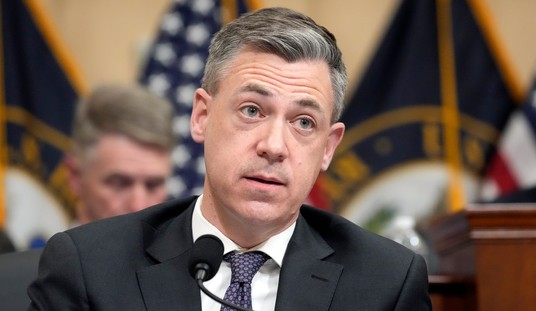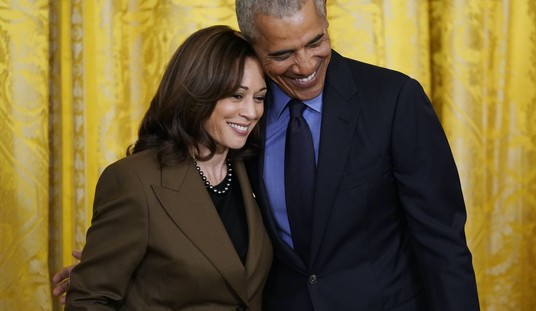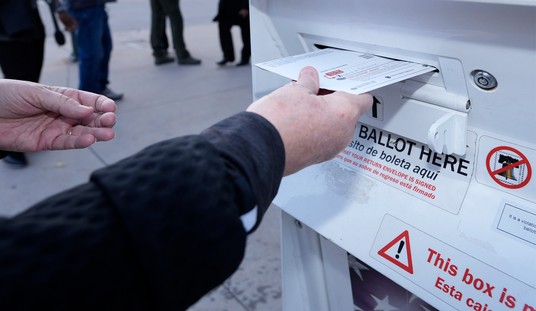In his current Canadian trip, Barack Obama has attracted a lot of attention for his statement that he would like to modify the NAFTA accord to give a higher status to labor and environmental standards. There’s been some blowback from Canada, but reaction has been relatively muted. What is surprising is that the reaction in Mexico has been muted as well. Given the Mexican government’s longstanding opposition, and the likelihood that new labor and environmental standards will hurt Mexico, this is a stunning change.
Looking back a few months, Mexican President Felipe Calderon made clear after the U.S. election that Mexico opposed renegotiating NAFTA — unless it came with broad immigration reform:
Mexican President Felipe Calderon warned Barack Obama against trying to renegotiate the North American Free Trade Agreement, saying restricting commerce would only encourage illegal Mexican emigration to the U.S.
“The day access is closed, workers will jump over whatever river or wall you put there,” Calderon told business leaders today at the Asia-Pacific Economic Cooperation forum in Lima, Peru, where leaders of 21 nations are meeting…
Mexico’s Calderon was most direct when he asked about Obama’s plans to rework Nafta.
“I hope that the next U.S. government won’t make this mistake,” he said. Instead of scaling Nafta back, the agreement should be expanded to include the free movement of workers, he added.
So Calderon laid down a marker: comprehensive immigration reform in exchange for amendments to NAFTA. This was a significant change for Calderon given his long stance in opposition to NAFTA changes, as well as that of the PAN party he heads, and of his PAN predecessor in the presidency (Vicente Fox).
That said, Mexican governments have for decades counted on the U.S. to provide economic opportunity to young workers who could not find good-paying jobs in Mexico. Presidents Fox and Bush had planned to work toward comprehensive immigration reform until September 11 changed how Americans view the borders. It’s no surprise that Calderon would continue to pursue this goal.
As for the U.S. side, the presidential election shows that terrorism has faded somewhat as a voter concern. With strong pro-amnesty majorities in both House and Senate, Obama might envision the day when Congress could approve a plan that ‘protects’ American companies from lower-wage Mexican competitors, in exchange for guaranteeing more Mexicans the right to work here.
And lo and behold, while it attracted almost no attention in the U.S., Mexican President Calderon says that Obama promised comprehensive immigration reform when the two met in January:
The president-elect of the United States, Barack Obama, committed to president Felipe Calderón to achieve a comprehensive immigration reform that includes family unification.
Calderon said that despite the obstacles and difficulties that exist in Congress and in U.S. public opinion, Obama is committed to advancing the implementation of immigration law for all, without exception, which addresses the situation of Mexicans already in the United States.
In this respect, Obama said his government will review the raids on undocumented, because he wants to ensure that the policy work “in a humane manner.”
Is it a coincidence that Calderon appears to have completely changed his tune – and is now completely open to NAFTA changes? He could not surrender so lightly the pro-NAFTA position he held for so long – not unless he felt that the deal offered something substantial for Mexico. And President Fox’s Foreign Affairs Minister Jorge Castaneda recently suggested that the return for Mexico could be big:
I would prefer Mexico and Calderon to welcome any attempt by Obama to revisit NAFTA, not to renegotiate it but to revisit it, because we also have a lot of things that we would like to improve in it…. Calderon should welcome it, and I’ve said this now for some time. He was very reluctant to do so, but apparently at the meeting with Obama he was much more flexible than he had been before…. He’s beginning to understand that it’s not a great idea to draw a line in the sand over this matter, partly because Obama probably will have to do something to deliver on his promises to some of the unions, and secondly because there can be some real advantages in it for Mexico.
NJ: What are some of those changes that Mexico would like to see?
Castaneda: Well, obviously, immigration, energy, some standing institutions as opposed to purely ad hoc institutions, infrastructure funds, social cohesion funds, a series of more long-term development planning and strategy and strategic goals — including security, by the way, along the lines of what Obama says he wants to do domestically for the United States. In other words, to move closer to — I wouldn’t say identically to — but move in the direction of a European-style North American Union the way it was 30 or 40 years ago. Not with a common currency, of course, not with a common executive, none of those things, but some of the policies that since the very late ’50s or ’60s and ’70s were adopted by the richer European countries.
As far as I have been able to determine, no one ever asked President Obama about Calderon’s account of their meeting. Has Obama made promises to pursue comprehensive immigration reform — or perhaps even a common market of sorts — within the framework of modifications to NAFTA? It would explain Calderon’s and Mexico’s sudden willingness to welcome a deal they have violently opposed since NAFTA went into effect.












Join the conversation as a VIP Member